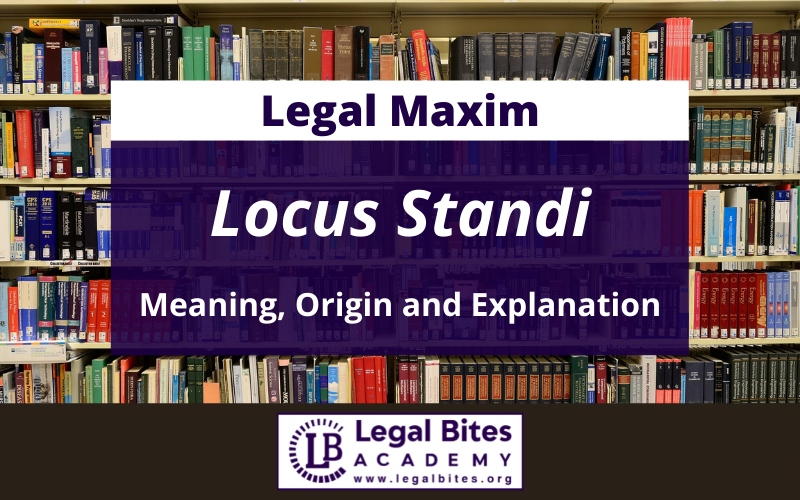Locus Standi: Origin, Meaning and Explanation
This article titled ‘Locus Standi: Origin, Meaning and Explanation’ is written by Sahajpreet Bhusari and discusses the maxim of Locus Standi. I. Origin and Meaning Locus Standi is a legal term of Latin origin. In Latin, the maxim literally translates to ‘the right to appear and be heard before the court of law’.[1] II. Explanation The maxim refers to… Read More »

This article titled ‘Locus Standi: Origin, Meaning and Explanation’ is written by Sahajpreet Bhusari and discusses the maxim of Locus Standi. I. Origin and Meaning Locus Standi is a legal term of Latin origin. In Latin, the maxim literally translates to ‘the right to appear and be heard before the court of law’.[1] II. Explanation The maxim refers to a party’s right to appear and be heard in a court of law, or to file a suit or action in front of the court. For example,...
This article titled ‘Locus Standi: Origin, Meaning and Explanation’ is written by Sahajpreet Bhusari and discusses the maxim of Locus Standi.
I. Origin and Meaning
Locus Standi is a legal term of Latin origin. In Latin, the maxim literally translates to ‘the right to appear and be heard before the court of law’.[1]
II. Explanation
The maxim refers to a party’s right to appear and be heard in a court of law, or to file a suit or action in front of the court. For example, an individual cannot challenge the constitutionality of legislation unless he or she can demonstrate that the law has damaged or affected them.
The court, on the other hand, would find that the complainant lacked’standi’ to launch the lawsuit and would dismiss it without even considering the validity of the unconstitutionality clause cited by him/her.
In legal terminology, Locus Standi refers to a plaintiff’s endeavour to persuade the court that the complaint has a sufficient relationship, correlation, or cause of action for the plaintiff. In other words, it refers to a person’s ability to present a case to a court of law or testify in front of a court of law.
III. Application
Article 32 of the Constitution gives citizens the right to petition the Supreme Court for the enforcement of their fundamental rights as outlined in Part III of the Constitution. Article 32 is known as the Constitution’s heart and soul. Part III rights would be meaningless if they could not be enforced.
If a statute is incompatible with the rights outlined in Part III, the Supreme Court might declare it ultra vires. To enforce citizens’ rights, the Supreme Court can issue orders, instructions, or writs such as habeas corpus, certiorari, mandamus, prohibition, and quo warranto.
IV. Illustration
In Indian courts, a foreign government that has not been recognised by the Indian government has no standing. Before filing a judicial review petition, the applicant must establish that they have a locus standi.
V. Case Laws
The Supreme Court held in M/S Northern Plastics Ltd v. Hindustan Photo Films Mfg. Co. Ltd[2] that the broader concept of locus standi in public interest litigation brought before this Court under Article 32 of the Indian Constitution, which is a fundamental right, or before High Courts under Article 226 of the Indian Constitution, which also provides a constitutional remedy, cannot be imported for deciding the right of appeal under the Customs Act’s statutory provisions.
The Bombay High Court dismissed the writ petition in Jasbhai Motibhai Desai v. Roshan Kumar, Haji Bashir Ahmed[3] on the grounds that no right vested in the appellant had been infringed, prejudiced, or adversely affected as a direct result of the order impugned by him, and as such, he was not an aggrieved person having locus standi in the matter.
References
[1] Locus Standi, Available Here.
[2] Civil Writ Petition No. 3023 of 1989.
[3] 1976 AIR 578.

